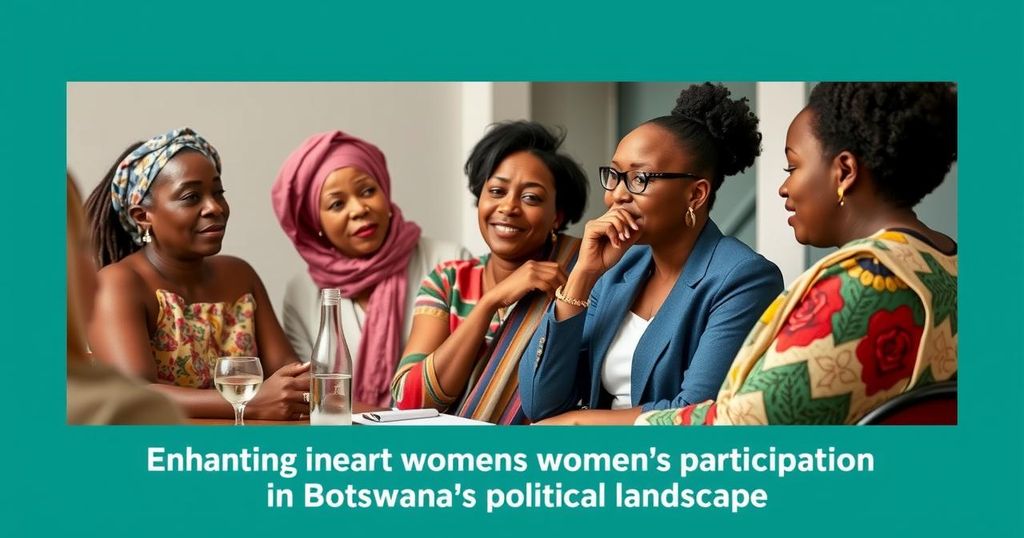Increase Women’s Representation in Botswana’s Parliament: A Call to Action

Botswana is experiencing a significant challenge regarding women’s representation in parliament, with only 28 women standing for election from 258 candidates in the last elections, resulting in a mere 4.92% of parliamentary seats held by women. Given that women make up 54% of eligible voters, there is a pressing need for political parties to reform their structures to promote inclusivity and equity. Historical initiatives like the SADC’s gender checklist highlight the importance of gender parity in governance.
Botswana’s political landscape is facing a critical challenge regarding women’s representation, particularly as the 2024 general elections approach. In the last elections, only 28 women participated out of 258 candidates, a mere 10.85%, with only three securing seats—translating to just 4.92% of the total 61 seats, a decline from 5.26% in 2019. Despite women constituting 54% of the eligible voting population, their participation in political decision-making remains woefully inadequate. It is imperative for political parties in Botswana to proactively address this disparity by promoting women’s inclusion in their ranks and ensuring diverse candidate selections. Additionally, lessons can be learned from regional efforts, such as the Southern African Development Community’s gender checklist implemented in 2002, which sought to enhance gender equality during elections. Several nations have also introduced constitutional measures aimed at fostering women’s inclusion and achieving gender parity.
The current statistics on women’s representation in Botswana’s parliament highlight an alarming trend that necessitates urgent attention. Political parties must recognize that their structures and candidate selections play a pivotal role in fostering a more inclusive political environment. If political institutions are to genuinely represent society and address the needs of all citizens, they must prioritize the integration of women within their ranks and ensure that women’s voices are adequately heard in governance. The upcoming elections present a crucial opportunity for Botswana to reevaluate its approach towards women’s representation and actively implement strategies that facilitate their empowerment in political spheres.
Furthermore, the patterns observed in Botswana’s political climate underscore a broader regional issue regarding gender equity in governance. As women remain underrepresented despite their significant presence as voters, the call for more robust policies and reforms becomes increasingly urgent. The successes of other nations in implementing frameworks that promote gender parity can serve as exemplary models for Botswana to emulate. Through strategic actions and commitments towards improving women’s representation, Botswana can strengthen its democratic processes while ensuring that the voices of half its electorate are not only acknowledged but actively integrated into the governance framework.
In conclusion, the pressing issue of women’s representation in Botswana’s parliament requires immediate and strategic action from the political parties. By addressing their internal dynamics and committing to equitable candidate selection processes, they can work towards rectifying the imbalances currently evident in the political landscape. To harness the full potential of its electorate, Botswana must strive for greater inclusivity, thereby facilitating a political environment that truly represents its diverse populace. It’s time to transform the question of “where are the women?” into a powerful move towards progress and equality in politics.
This op-ed addresses the ongoing challenge of women’s under-representation in Botswana’s political sphere, particularly as the nation prepares for its 2024 general elections. Despite women holding a significant portion of the voting population, their presence in political power remains minimal, prompting an examination of both the electoral system and the role of political parties in fostering inclusivity. Historical initiatives, such as the Southern African Development Community’s gender checklist, underscore regional efforts towards gender equality in elections, indicating there are precedent frameworks that Botswana could adopt to enhance women’s inclusion in governance.
In summary, addressing the under-representation of women in Botswana’s parliament is crucial for the country’s democratic evolution. Political parties must take initiative by implementing strategies to boost women’s participation in elections and leadership roles. This commitment is essential not only for achieving gender equity but also for ensuring that the diverse needs of all citizens are met through representative governance. Therefore, it is vital that the discourse surrounding women’s roles in politics shifts from questioning their absence to actively creating pathways for their inclusion and empowerment.
Original Source: constitutionnet.org








